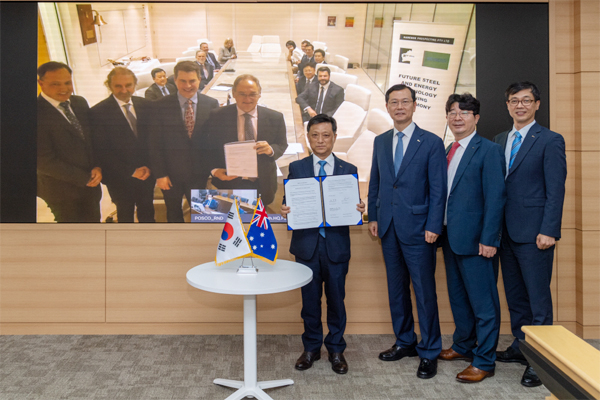Carbon neutrality
POSCO partners with Australia’s Roy Hill for carbon neutrality initiatives
The steelmaker owns 12.5% of Roy Hill since 2010 and annually procures 16 million tons of iron ore from the company
By Aug 02, 2021 (Gmt+09:00)
2
Min read
Most Read
LG Chem to sell water filter business to Glenwood PE for $692 million


KT&G eyes overseas M&A after rejecting activist fund's offer


Mirae Asset to be named Korea Post’s core real estate fund operator


StockX in merger talks with Naver’s online reseller Kream


Meritz backs half of ex-manager’s $210 mn hedge fund



South Korea’s top steelmaker POSCO and Australia’s major iron ore supplier Roy Hill have strengthened their existing partnership to conduct joint research to produce hydrogen and develop hydrogen-based steelmaking processes.
POSCO said on August 2 that it has agreed with Roy Hill to work together to significantly reduce carbon emissions in mining and steel sectors.
Roy Hill produces 60 million tons of iron ore in the Pilbara region of Western Australia annually, of which it supplies 16 million tons to POSCO for steelmaking. POSCO in 2010 invested 1.3 trillion won ($1.13 billion) in Roy Hill to acquire a 12.5% stake in the Australian mining company.
Under the new deal, the two firms will run joint research to set up an optimal system for manufacturing hot briquetted iron (HBI) with POSCO’s hydrogen-based steelmaking technology.
HBI, a type of reduced iron used for steelmaking, has been typically produced using coal as a reducing agent to separate oxygen from iron ore. The use of coal in the production process had inevitably emitted carbon dioxide.
On the other hand, hydrogen-based steelmaking processes can manufacture HBI without emitting carbon dioxide by using hydrogen as the reducing agent.
POSCO and Roy Hill will also devise ways to produce hydrogen in Australia. In the short run, the two firms will manufacture hydrogen using Australia’s sufficient supply of natural gases, while in the long run, they will review options to set up more comprehensive hydrogen manufacturing facilities in the country using solar power and wind power.
Another area of collaboration under the agreement is carbon capture, utilization and storage (CCUS), a process that captures carbon dioxide in the manufacturing process to prevent the gas from entering the atmosphere.
“By putting together POSCO’s world-class steelmaking technology and Roy Hill’s mining expertise to commercialize hydrogen-based steelmaking processes, we will be able to make a major turning point towards carbon neutrality,” said Kim Hak-dong, POSCO’s head of steel business unit.
POSCO last year announced its long-term carbon neutrality goal by 2050. Compared to the level in 2020, the company will reduce carbon emissions by 20% before 2030, 50% before 2040 and 100% before 2050.
Write to Jung-hwan Hwang at jung@hankyung.com
Daniel Cho edited this article.
More to Read
-
 Battery materialsPOSCO to build $200 mn nickel refining plant to ramp up battery materials
Battery materialsPOSCO to build $200 mn nickel refining plant to ramp up battery materialsJul 28, 2021 (Gmt+09:00)
1 Min read -
 EarningsPOSCO returns from pandemic blues with record quarterly profit
EarningsPOSCO returns from pandemic blues with record quarterly profitJul 09, 2021 (Gmt+09:00)
3 Min read
Comment 0
LOG IN


